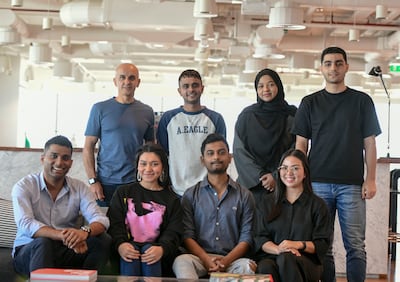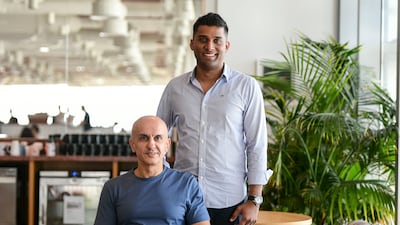An autoimmune disorder requiring Keswin Suresh to receive support from nurses at home during the Covid-19 pandemic left him dissatisfied with the service, but also helped him to identify a gap in the market for standardised home healthcare services.
The UAE resident went up to Samer Masri, his boss at the time and a seasoned entrepreneur, to pitch the idea for a technology-based start-up that would address these pain points.
Mr Masri was piqued by the idea, also because of his personal experience.
“I could relate with that because this brought me back to the time where my late mother was sick and the arrangement of taking care of her at home, getting a nurse and we were sitting far away, and I didn't know what's happening with her … it was very hard,” Mr Masri, who is of Palestinian origin, says.
Keen to build something “new and something that can make an impact”, he took time to do due diligence before trying to figure out the right business model.
“A lot of telehealth start-ups were also booming, so there was a major roadblock in terms of checking and determining whether home healthcare is the right route to take or not,” Mr Suresh, an Indian, says.
“Eventually we landed in terms of home healthcare itself, we saw a huge opportunity with a fragmented market and at the same time, a big patient pain point and lot of challenges being faced by the providers, as well.”
The duo set up DarDoc – Dar means home in Arabic – in the Abu Dhabi Global Market in 2021 with around $400,000 of funding in the first stage – combination of bootstrapping plus angel investment.
The start-up, which also received backing from Hub71, was then incubated by the Abu Dhabi Department of Health.
“So, that gave us the leverage of utilising their [DoH] office space and saving on that burn. We always believed in capital allocation efficiency to stay lean, spend less and grow fast – Hub71 helped us too – but all of this was equity free,” says Mr Suresh, chief operating officer of DarDoc.
“The first external investor that came through was Flat6Labs, which [also has a partnership with] DisruptorAD and they dropped in a ticket of $215,000. And thereafter, this year, we also closed another ticket from an angel investor who comes from the healthcare industry; he chipped another $200,000.”
The start-up, which offers primary home healthcare services for newborns, adults and the elderly, as well as physiotherapy services, Vitamin IV drops, and laboratory tests at home, is focusing on technology as its core offering.
DarDoc found that many healthcare providers continued to use “primitive” methods with heavy processes in their back offices, which was leading to a “big leakage” in their balance sheets, says Mr Suresh.
It came up with a Cloud Suite solution that helps providers to manage the scheduling of the nurses, all the patient entries and everything “so that they spend less time on this cookie-cutter approach of managing their operations and, rather, solely focus on delivering very good quality of care to the patients and users that they are working with”, he says.
“And the system is not only for users that come from DarDoc to you like a typical marketplace, but you can also on-board any other patients that you are looking after as a provider.
“So, this became a very big value proposition for the providers that we work with and they started seeing us as a very good incentive … Today they see us as an operational enabler, as well as an additional source of revenue stream and, at the same time, we don't charge them anything for this.”
Mr Masri, who serves as the company’s chief executive, says the home care operations they offer to providers are key to changing the ecosystem.
“There is a good amount of professional home care providers [in the UAE]. In some other countries they suffer from a shortage but here there is a wastage because utilisation is very poor,” he says.
“So, we are saving them [providers] money and time doing this and allowing them to focus on the care of the patients rather than worrying about preparing a schedule for their drivers.
“We are a pure-tech company, we are not just a facilitator or aggregator of healthcare services. We focus on developing the tech for … operational monitoring and any aspects needed to improve the level of care for patients.”

From a consumer perspective, the co-founders are personally involved in customer support to ensure that patients receive good care.
All the providers are vetted thoroughly before being added to the platform and DarDoc also offers training programmes to service givers.
Currently, the company works with about 22 providers, with five more in the pipeline. This gives it the bandwidth of offering services from about 500 professionals across Abu Dhabi and Dubai.
So far, DarDoc has done more than 120,000 nursing hours of care and finished close to 9,500 unique visits at home.
In terms of its business model, while the operational suite is offered free to providers, DarDoc decides on a pricing agreement with them. Based on that, the start-up positions its services on its mobile application.
However, the founders stress that they offer extremely “affordable” prices when compared with the traditional operators, since they cut down on the operational costs.
The healthcare sector in the GCC and the wider Mena region has registered significant growth and transformation in recent years, driven by the Covid-19 pandemic and the subsequent investments poured into the industry by stakeholders.
Healthcare expenditure in the GCC is projected to reach $135.5 billion in 2027, growing at an annual rate of 5.4 per cent from 2022, Dubai-based Alpen said in a report earlier this year.
Healthcare spending as a proportion of gross domestic product in the region is expected to grow from 5 per cent in 2022 to 5.8 per cent in 2027.
In particular, the GCC countries are witnessing a rise in demand for long-term and post-acute care, including home healthcare services and rehabilitation services, the report said.
“Demand for such services is largely driven by the region’s ageing population as more people require geriatric care, rehabilitation and home care services,” Alpen said.
Innovative solutions such as telemedicine, remote patient monitoring and consultancy, as well as online purchase of prescription medicines allowed a significant proportion of primary care delivery to shift to at-home services.
“This has fast-tracked the digital transformation of the industry and enhanced the participation of private players, leading to larger number of public-private partnerships in the healthcare space,” the report added.
Mr Suresh says integrating technology into the healthcare industry is challenging because on one side, patients always want an emotional touch, and on the other, many providers remain “adamant” in terms of adopting technology.
“So, the learning curve, the implementation curve, it takes time. But if you do it the right way, then you are there in it for a very long time,” he says.
DarDoc is aiming for profitability towards the end of this year.
“I would say we will hit the monthly breakeven point before the end of this year,” Mr Masri says.
He also confirms that the start-up is doing a small funding round mainly focused on angel investors.
“We have big potential; we have developed a lot. And we believe we can go for a big round maybe end of next year,” he says.
Looking ahead, the start-up is seeking to move beyond the UAE, starting with Saudi Arabia and other parts of the GCC before looking at Egypt.
“We want to have a strong establishment within the region,” Mr Suresh says.
The company is also planning to diversify its revenue stream by expanding into the management and prevention of lifestyle diseases.
DarDoc is set to soon introduce a weight loss programme in the UAE in partnership with a regional healthcare provider.
“It will involve blood tests at home, teleconsultation with an endocrinologist and a nutritionist. We are also providing our users with a wearable [device] to track their blood sugar control levels on a real-time basis, and medications will be delivered to your doorstep to make sure that you are on a very disciplined weight loss journey with DarDoc,” Mr Suresh says.
The start-up also plans to expand to other segments.
“We are trying to be the best one-stop solution for all of the requirements in non-sick care,” says Mr Masri.
Q&A with Samer Masri and Keswin Suresh, co-founders of DarDoc
Who is your role model?
Mr Suresh: I’m a big fan of Tim Cook because he is a supply chain genius. Taking the reins over from somebody who was a legend and visionary like Steve Jobs was definitely not easy. Apple was still growing and then taking it from there to a $3 trillion company is an unimaginable feat that he has achieved.
Mr Masri: My uncle. He passed away when he was 93 and he was going to work every day [until then]. He had a small money exchange and I started working with him when I was 10 years, I used to count notes. I lost my father when I was seven, so I learnt a lot [from my uncle] and … I will also keep working as long as I'm alive.
Any company that you wish you had started?
Mr Masri: Stripe, the payment gateway. They make it easy for payments, very smooth. We are their customer, it is brilliant.
Mr Suresh: Plaid, it is an amazing FinTech start-up and how it kind of navigated through a heavily conventional American banking system often surprises me. It is an impossible industry to crack.
If you could start all over again, is there anything that you would do differently?
Both: We would go faster.
What new skills have you learnt while setting up DarDoc?
Mr Suresh: Performance marketing, CRM, content marketing, content writing, the list goes on.
Mr Masri: Usually, I'm impatient, but I have learnt to be patient.
What is your advice to other entrepreneurs?
Mr Masri: You have to be ready to do experiments, take risks. And you have to live in doubt. Doubt everything you do. I'm not talking about confidence. The confidence of achieving your main objectives should be obvious, but doubt every step you take, like how you can make it better.
Mr Suresh: The speed of execution is all that matters.


